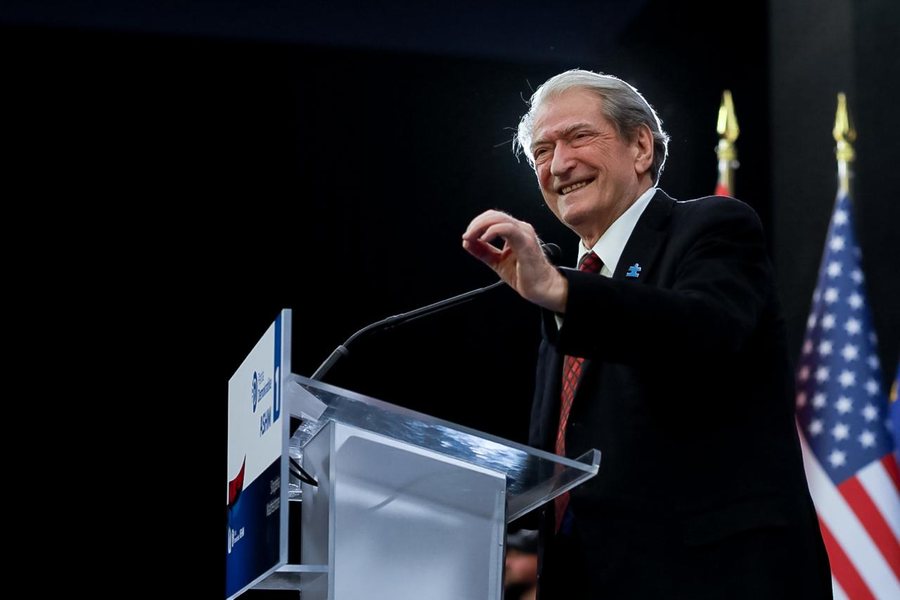The legal, moral, and political problem with Berisha’s attempt to clear his name with money

Photo: Sali Berisha, Chairman of the Democratic Party of Albania.
Opinion by Mero Baze
The issue regarding the $6 million contract between Berisha’s Democratic Party (DP) and an American lobbying firm has three dimensions: legal, moral, and political.
The legal aspect dominates every clause of this contract.
Albanian law on party financing explicitly forbids foreign entities from funding election campaigns. If the DP’s official statement—that the funds were provided by an Albanian-American foundation—is accepted as evidence, this clearly constitutes financing by a foreign entity and as such it is illegal under Albanian law.
Albanian citizens who wish to support the DP must deposit their donations directly into the party’s accounts in Tirana, from where it can then make the payments. Any other method constitutes a criminal offense. It echoes Lulzim Basha’s previous controversy over Russian financing, where he initially claimed €500,000 had been raised by Albanian-Americans, but later tried to distance himself from this statement when confronted by the law. Interestingly, the first to attack Basha after his falling-out with Berisha were precisely those who are now involved in signing this contract. Given the similarity in the deceptive methods used, this strongly suggests that it was Berisha himself who was behind that earlier deal as well.
Even more critical is the initial payment of €750,000 made upon signing the contract. We must await its declaration to the Central Election Commission (CEC), including details of the DP’s payment method and sources, to avoid repeating Basha’s scenario of disclaiming responsibility for substantial funds allegedly contributed by others.
Currently, the only name officially associated with the contract is Nuredin Seci, an electrician from Tropoja with a passion for mountain climbing, who resides in New Jersey and lacks sufficient means even for his own retirement, let alone for funding Berisha’s DP. His sole logical connection to this case is his membership in the Vatra organization’s leadership in New Jersey. Thus, the Albanian-American group possibly behind this payment might indeed be Vatra, which effectively serves as an informal branch of the DP in the U.S.
If true, this carries broader legal consequences, especially for those who are based in Tirana, because Vatra is governed by U.S., not Albanian, law—and this makes it a foreign entity under Albanian law.
It’s worth recalling that in 2012, when Berisha was Prime Minister, he allocated hundreds of thousands of dollars from the Albanian state budget via a Council of Ministers decision to Vatra, thus engaging in an act of conflict of interest through the misuse of public funds.
The €750,000 paid on April 4 blatantly violates Albania’s party financing laws and calls for a thorough investigation. Remarkably, this contract doesn’t even include Chris LaCivita. He is either receiving secret funds or has another, even larger contract—this remains to be seen.
What is clear is that we’re witnessing an act of public deception through which cash payments from a family designated “non grata” by the U.S. are being used to clean their international reputation during an electoral campaign, ironically at a time when Berisha is loudly highlighting the poverty of Albanians and condemning the “hidden billions” accumulated through corruption by those in power.
The second major issue here is moral.
The only viable strategy for Berisha to challenge his designation as corrupt, a democracy-underminer, and justice manipulator by the U.S. and the UK was to portray himself as the victim of a conspiracy—though this claim is demonstrably false.
Logically, it follows that he should have avoided trying to buy back his “lost honor” in the U.S. and UK. Yet, he previously spent approximately £700,000 (around 1 billion Albanian Lek) in the UK on precisely this futile effort.
Now, he has paid the initial $6 million in the U.S., desperately hoping this will remove the shame brought on him by the sanctions. His narrative—that his “non grata” status, allegedly resulted from a payment of €200,000 to Charles McGonigal by Agron Neza, another Tropoja native, will be removed through €6 million guaranteed by Nuredin the electrician—is both absurd and immoral.
A genuinely uncorrupt person would struggle even to pay €600 for a lawyer, let alone €6 million. Berisha’s willingness to spend enormous sums solely to remove his sanctions not only highlights his own and his family’s awareness of their corruption but also underscores his anxiety about his children’s “non grata” status and their future political ambitions.
Finally, this issue is deeply political, touching even on the internal rivalries within the corridors of the White House.
Berisha’s chosen lobbyist, Carlos Trujillo—recipient of the $6 million—previously led the anti-Grenell faction within the White House, successfully blocking Grenell’s bid for Secretary of State, when Grenell believed himself to be the favorite compared to Rubio.
By becoming involved in the internal power struggles of the new administration, Berisha risks wasting his $6 million investment, potentially reigniting past rivalries and provoking fresh conflicts.
Moreover, this brazen attempt to lift a U.S. sanction through financial means embarrasses America, portraying it as a corruptible power that can settle any matter if you pay enough money.
This sets a troubling precedent for all sanctioned individuals. If Berisha manages to remove his sanctions through a payment of $6 million in unexplained cash, someone like Tom Doshi, with much cleaner business-derived millions, could potentially do so more easily.
Others on the sanction list may follow suit.
This not only undermines U.S. authority in the eyes of Albanians, reducing it to a “paper tiger” in the fight against corruption, but also encourages any potential targets of future sanctions, now clearly aware of the price required to erase their stains.
In effect, Berisha is doing a favor to every sanctioned Albanian and anyone who risks future sanctions.
Thus, the only tangible political consequence stemming from this situation is that it will empower Albania’s corrupt elite while severely weakening America’s credibility in the region—no small achievement for those who seek power to enrich themselves.


